Mothers play an essential role in the upbringing of their children. They provide love, support, and guidance that shape their children’s development and future.
However, some mothers can be toxic, damaging, and harmful to their children’s mental and emotional well-being. Toxic mothers can create an environment that is emotionally, physically, and psychologically damaging to their children.
Growing up with and dealing with a toxic mother can have a profound impact on a child’s development. Some of the effects of toxic mothers on their children are that they struggle with low self-esteem, anxiety, depression, and other mental health issues.
They may also have difficulty forming healthy relationships and may struggle with trust issues.
In order to break free from their unhealthy behavior, it’s important to understand the psychology of toxic mothers, the reasons your mom is toxic, the types of toxic mothers, and the signs of toxic mothers.
But before all this, let’s find out what is a toxic mother exactly.
Related: How An Unloving Mother Can Ruin Her Child’s Chance At Happiness
What Is A Toxic Mother?
Toxic mothers exhibit harmful and damaging behavior toward their children. This behavior can range from subtle emotional manipulation to overt physical abuse. They’re emotionally manipulative, controlling, and critical.
A toxic mother may create an environment that is emotionally unsafe for her child, with inconsistent or unpredictable responses to the child’s emotional needs. This can result in the child feeling insecure and anxious, never knowing whether they will receive love and support or be met with criticism and rejection.
They may also use emotional manipulation to control their children, which can create a cycle of guilt, fear, and obligation in their kids. The child may feel responsible for their mother’s emotions and needs, leading to feelings of overwhelm and a lack of self-worth.
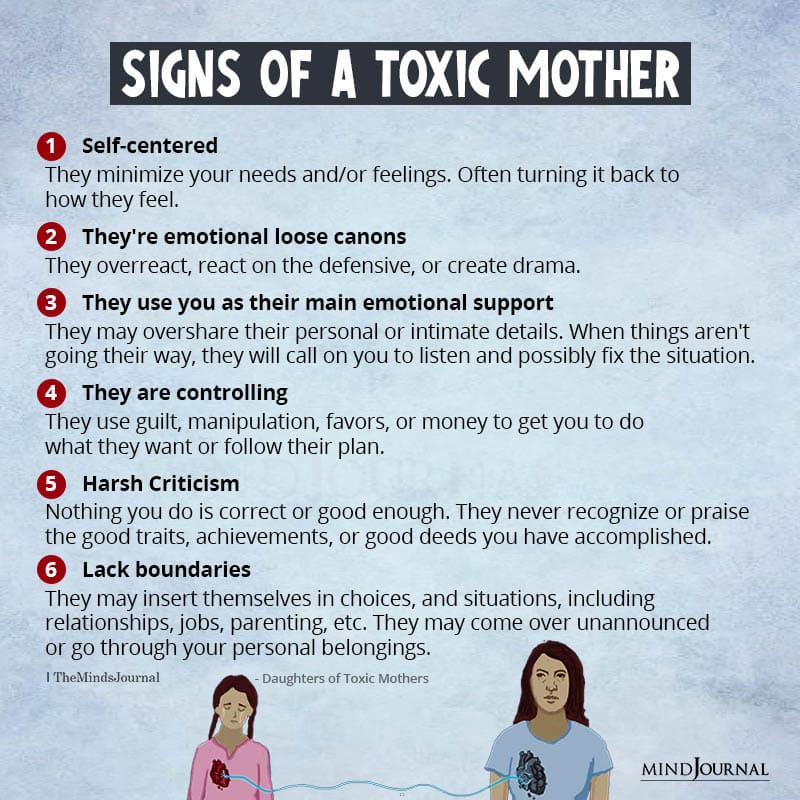
What Are The Types Of Toxic Mothers?
There is no single definitive way to classify toxic mothers as there are various types of toxic behavior that a mother can exhibit. However, here are some common types of toxic mothers:
1. Narcissistic Mother
She is obsessed with her own needs and desires, often putting her own needs above her children’s needs. She may belittle, criticize, or invalidate her children’s feelings and accomplishments.
Dealing with a toxic mother like this means you will never feel like you are never good enough.
2. Overprotective Mother
She is overly controlling and can be extremely critical of her children’s choices and decisions. She may try to control every aspect of their lives, including their relationships, hobbies, and careers, leaving little room for personal growth and independence.
3. Enmeshed Mother
She has an unhealthy attachment to her children, treating them more like friends than her offspring.
She may rely on her children for emotional support and validation and may be overly involved in their lives, which can cause them to feel smothered and unable to develop their own identities.
Related: Toxic Mother-Daughter Relationships: Can You Identify These 8 Dysfunctional Patterns?
4. Manipulative Mother
She uses guilt, emotional blackmail, and other manipulative tactics to get her way. She may try to control her children through fear, shame, or intimidation, and may use their love for her as a way to manipulate them into doing what she wants.
5. Absent Mother
She is physically or emotionally absent from her children’s lives. She may be too focused on her own needs or issues to be there for her children, leaving them feeling neglected, unloved, or abandoned.
6. Abusive Mother
She uses physical violence, such as hitting or slapping, or emotional abuse, such as belittling, humiliating, or insulting her children. She may also use threats or intimidation to control her children and make them feel afraid of her.
Dealing with a toxic mother like this means you’ll always be scared of her, and home will never feel like a safe space.
How Toxic Mothers Are Made?
In order to deal with them in the right way, it is important to understand the psychology of toxic mothers.
The behavior of toxic mothers can be influenced by a variety of factors, including their own upbringing, their personality traits, their life experiences, and their relationship with their children.
It’s important to note that none of these factors excuse toxic behavior and that all mothers have a responsibility to seek help and support if they are struggling with their parenting or mental health.
So, what creates a toxic mother? Here are some potential reasons your mom is toxic.
1. Childhood trauma
This is one of the biggest reasons your mom is toxic.
A mother who experienced childhood trauma, such as abuse, neglect, or abandonment, may struggle to form healthy attachments and relationships with her children.
She may also have difficulty regulating her emotions and behavior, leading to outbursts of anger or other toxic behavior.
Related: Is Your Mom A Karen? 7 Signs She Will “Speak To The Manager”
2. Personality disorders
Mothers with certain personality disorders, such as narcissistic personality disorder, borderline personality disorder, or antisocial personality disorder, may exhibit toxic behavior.
These disorders can cause a person to be self-centered, manipulative, and lack empathy, making it difficult to form healthy relationships with others.
3. Addiction
A mother struggling with addiction may be emotionally unavailable, erratic, or abusive toward her children.
Substance abuse can also impact a mother’s ability to provide a safe and stable environment for her children, leading to neglect or even endangerment.
4. Stress and pressure
A mother who feels overwhelmed by the demands of motherhood or other life stressors may lash out at her children or exhibit other toxic behavior.
She may also struggle with feelings of inadequacy or insecurity, leading her to criticize or belittle her children as a way of coping with her own negative emotions.
5. Cultural and societal expectations
Another one of the major but underrated reasons your mom is toxic.
In some cultures and societies, there may be specific expectations for mothers to behave in a certain way or to prioritize their children above all else. This can create pressure and stress for mothers, leading to toxic behavior as a coping mechanism.
8 Signs Of Toxic Mothers
1. She is overly judgemental and critical.
While it’s true that moms have a crucial role in nurturing their children and providing them with a safe environment to grow physically, mentally, and emotionally, an overly critical mom can have a negative impact on her child’s development.
Instead of offering praise and encouragement, an overly critical mom tends to focus on the negative and may make her child doubt their abilities. She will make fun of your appearance, intelligence, or interests, belittle your accomplishments, and make you feel like you can never measure up to her expectations.
Related: 20 Clear Signs You Are The Child Of Toxic Parents
2. She gaslights you all the time.
Gaslighting is a form of psychological manipulation that involves denying or distorting the truth to make someone doubt their sanity or memory.
Toxic mothers may use gaslighting to make you doubt your own experiences or feelings, making you feel confused and insecure. This gaslighting can cause long-term damage to your sense of self and your ability to trust others.
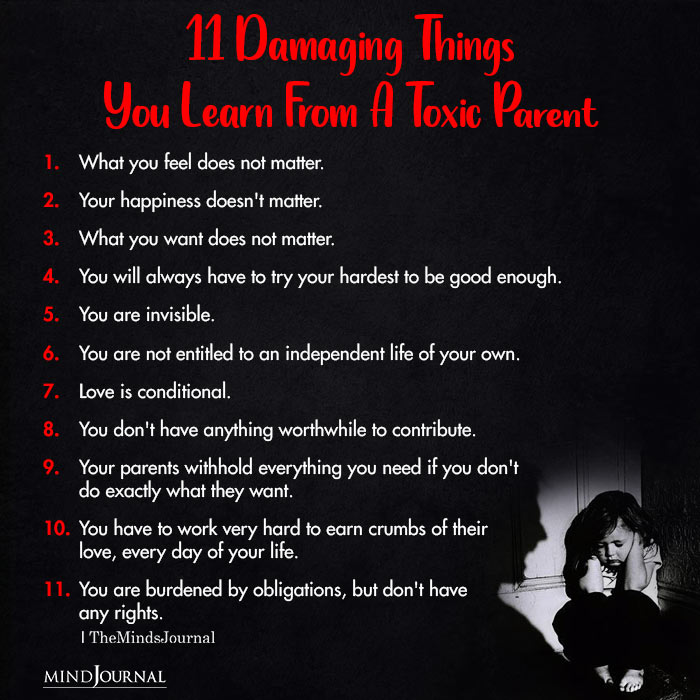
3. She compares you with others.
One of the biggest signs of toxic mothers is this. She will always compare you to others, making you feel inferior and inadequate. She may compare you to your siblings, friends, or other children, highlighting your flaws and shortcomings.
This comparison can create a sense of competition and jealousy among you and your siblings and friends, leading to strained relationships.
4. She is emotionally unavailable.
Toxic mothers can be emotionally distant and unresponsive to their children’s emotional needs. She will dismiss your feelings or ignore your emotional distress, leaving you feeling unsupported and unimportant.
This emotional neglect can cause you to develop attachment issues and struggle with relationships later in your adult life. Her emotional neglect will keep on haunting you and will stop you from having emotionally stable and healthy relationships.
5. She plays favorites when it comes to you and your siblings.
Toxic mothers may exhibit favoritism towards one child over others, creating a sense of resentment and competition among you and your siblings.
Try to understand the psychology of toxic mothers. She will praise one child excessively while criticizing or ignoring others, leading to feelings of inadequacy and low self-esteem in the neglected child.
6. She has unrealistic expectations.
One of the biggest truths about toxic mother is that she always has unrealistic expectations of you, expecting you to excel in every area of your life.
She will push you to achieve academic, athletic, or artistic success, regardless of your interests or abilities. This pressure can lead to you feeling overwhelmed, anxious, and burnt out gradually.
7. She uses physical or verbal abuse.
Toxic mothers may use physical or verbal abuse to discipline their children, causing them to feel scared and traumatized.
She has been using physical punishment, such as hitting or spanking, or verbal abuse, such as shouting or name-calling, to control your behavior, since you were a kid. This abuse can lead to long-term psychological damage and emotional scars.
Related: Narcissistic Mother: 5 Signs Your Mother Is A Narcissist
8. She uses guilt as a tool.
When your mom is emotionally toxic, she may use guilt as a tool to manipulate you into doing what she wants. She will make you feel guilty for not meeting her expectations or for expressing her own needs and desires.
This guilt can lead to you sacrificing your own well-being to please your mother, leading to feelings of resentment and self-neglect.
Effects Of Toxic Mothers On Their Children
Here are some of the major effects of toxic mothers on their children.
- Low self-esteem
- Anxiety and depression
- Trust issues
- Perfectionism
- People-pleasing behavior
- Difficulty expressing emotions
- Anger and resentment
- Attachment issues
- Inability to set boundaries
- Impact on future relationships
How To Deal With Toxic Mothers?
When you have a toxic relationship with your mother, there are certain things you can do to deal with her toxic behavior.
- Acknowledge the situation: Recognize that your mother’s behavior is toxic and accept that it may not change.
- Set boundaries: When your mother is emotionally toxic, make sure that you establish clear boundaries and limits on interactions to protect yourself from toxic behavior.
- Seek support: Reach out to friends, family, or a therapist to discuss your feelings and receive emotional support.
- Practice self-care: Take time for yourself and engage in activities that bring you joy and relaxation to alleviate stress and maintain your well-being.
- Avoid engaging in toxic behavior: Refrain from participating in toxic communication or behaviors with your mother and maintain a level of respect.
- Communicate assertively: While dealing with a toxic mother, make sure that you communicate your needs and feelings in a clear and assertive manner, without attacking or blaming your mother.
- Don’t take it personally: Understand that your mother’s behavior is a reflection of her own issues and not a reflection of your worth or value. Understanding this psychology of toxic mothers can help you protect yourself from the hurt.
- Set realistic expectations: Accept that your mother may never be the parent you want or need, and set realistic expectations for your relationship.
- Consider therapy: When you have a toxic relationship with your mother, consider therapy or counseling to help process any emotional trauma caused by the toxic relationship and develop healthy coping mechanisms.
- Limit or cut off contact: In severe cases where the relationship is causing significant harm, it may be necessary to limit or cut off contact with toxic mothers to protect oneself.
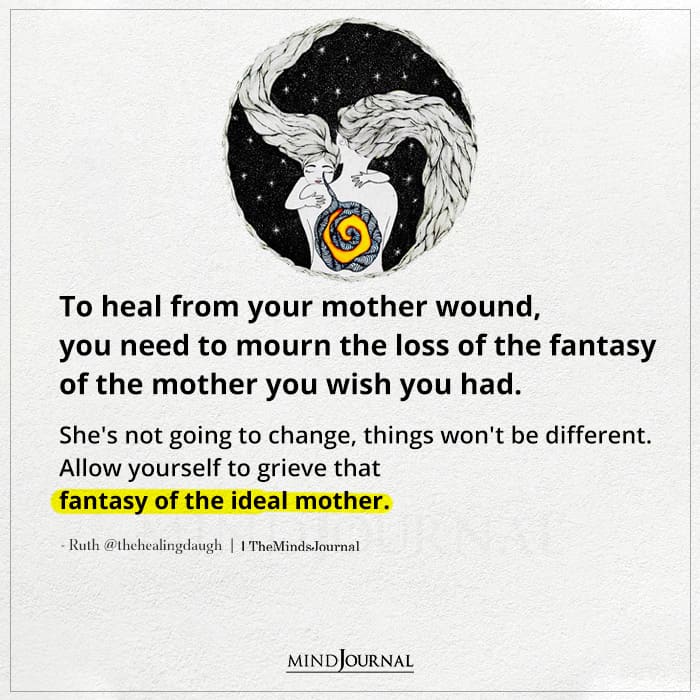
Conclusion
Dealing with a toxic mother can be a challenging and emotional journey, but it is important to prioritize your own well-being and mental health. The effects of toxic behavior on children can be profound and long-lasting, impacting their self-esteem, relationships, and emotional well-being.
Related: Narcissistic Mother Empath Daughter: 7 Signs You Have The ‘Good’ Daughter Syndrome
While the effects of toxic mothers on their children can be significant, with time, support, and therapy, it is possible to heal and recover from the emotional trauma. Ultimately, prioritizing yourself and your happiness is crucial, and seeking help when needed is a sign of strength, not weakness.
By taking steps to address the impact of your toxic mother, you can break the cycle of abuse and build a healthy, fulfilling life for yourself.
Want to know more about toxic mothers and how to deal with toxic mothers? Check this video out below!
Frequently Asked Questions (FAQs)
What are the things toxic mothers say?
Some of the most common things that toxic mothers say are – “You’re worthless”, “You’re such a disappointment”, “No one will ever love you”, “You can’t do anything right”, “You’re so dumb”, etc.
Should I forgive my toxic mother?
Yes, you should. It’s important to forgive your toxic mother not because you condone her behavior, but because you want to let that pain go and move on in your life and find the happiness you deserve.
Has your toxic mother made you toxic?
There’s no guarantee that being raised by a toxic mother can make you toxic. However, it can have a negative impact on your mental, emotional, and psychological health.
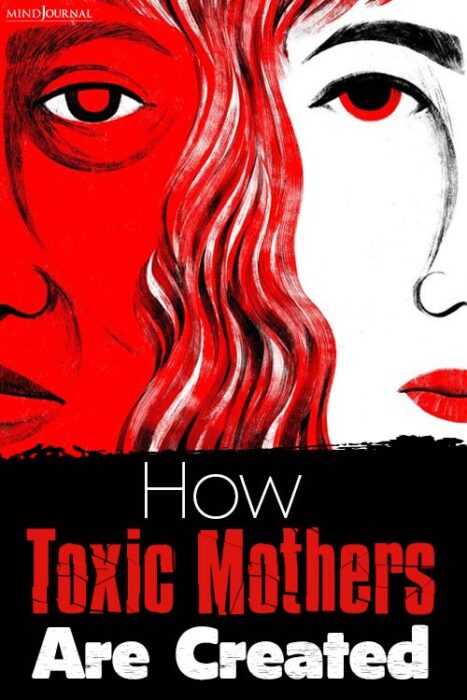
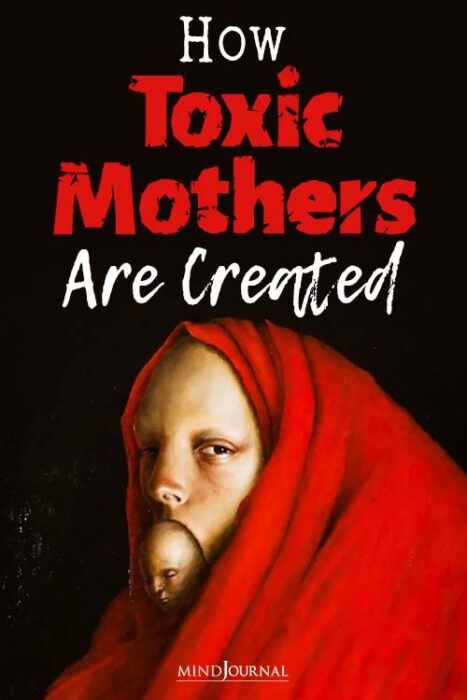
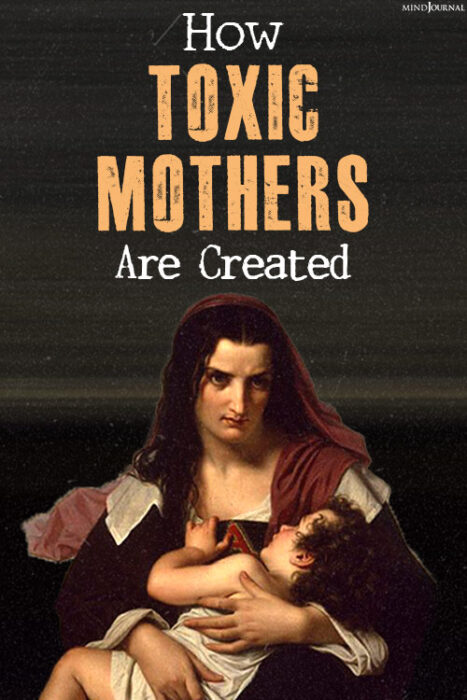
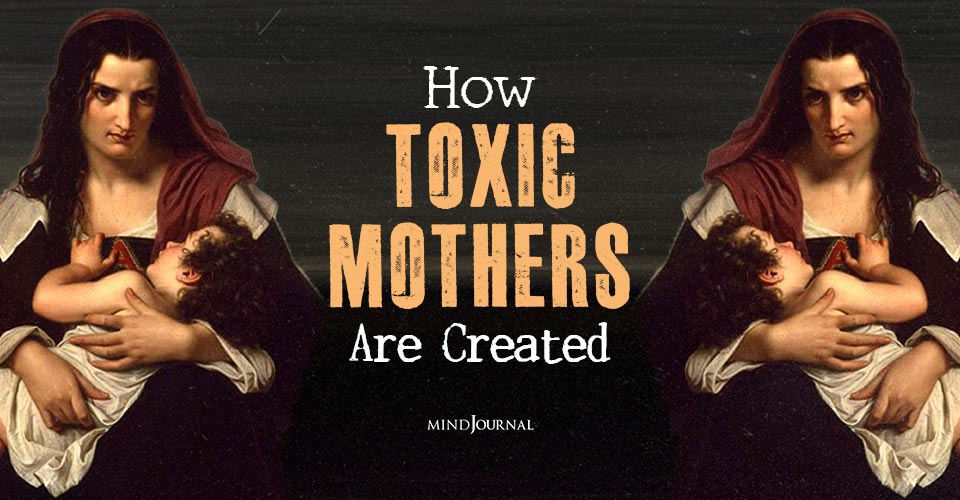







Leave a Reply
You must be logged in to post a comment.